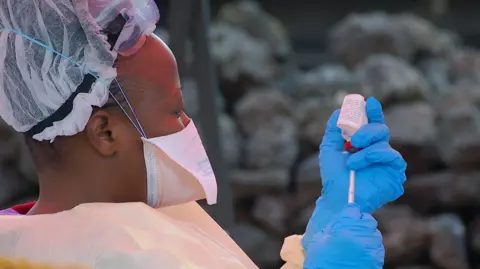The Congolese government has imposed a ban on media coverage of former President Joseph Kabila, explicitly prohibiting interviews with him and members of his political party. This decree follows Kabila's return to the Democratic Republic of Congo last month and coincides with escalating tensions with the current administration led by President Félix Tshisekedi. The government is looking to prosecute Kabila, who faces accusations of treason and potential connections to the M23 rebel group, a claim he has denied.
Christian Bosembe, the head of the Supreme Council of Audiovisual and Communication (CSAC), stated that any violation of the ban could lead to the suspension of news outlets. In response, a spokesperson from the M23 indicated that the media operating in their controlled regions would refuse to comply with the ban. Although Kabila has not commented, his party secretary, Ferdinand Kambere, criticized the ban as "arbitrary" on social media.
Recently spotted in Goma, an eastern city under M23 control, Kabila has voiced strong criticisms towards the government, particularly after the Senate voted to revoke his immunity related to accusations of supporting the rebel group. Accusations linking Rwanda, a neighboring country, to the M23 have been firmly denied by Kigali. Kabila, who remains free from any formal charges, described the current government as a "dictatorship," a remark met with dismissive rebuttals from government officials.
Human rights activists denounce the media ban as an "abuse of power." Political analyst Ambroise Mamba cautioned that such restrictions might only intensify public curiosity regarding Kabila's movements and activities. Since returning from a two-year self-imposed exile, Kabila's party has actively shared updates on his engagements with civil society groups and local religious leaders through online platforms.
Additional reporting from BBC Monitoring highlights the ongoing tumult in the DR Congo, where questions about foreign interference and internal governance persist.
Christian Bosembe, the head of the Supreme Council of Audiovisual and Communication (CSAC), stated that any violation of the ban could lead to the suspension of news outlets. In response, a spokesperson from the M23 indicated that the media operating in their controlled regions would refuse to comply with the ban. Although Kabila has not commented, his party secretary, Ferdinand Kambere, criticized the ban as "arbitrary" on social media.
Recently spotted in Goma, an eastern city under M23 control, Kabila has voiced strong criticisms towards the government, particularly after the Senate voted to revoke his immunity related to accusations of supporting the rebel group. Accusations linking Rwanda, a neighboring country, to the M23 have been firmly denied by Kigali. Kabila, who remains free from any formal charges, described the current government as a "dictatorship," a remark met with dismissive rebuttals from government officials.
Human rights activists denounce the media ban as an "abuse of power." Political analyst Ambroise Mamba cautioned that such restrictions might only intensify public curiosity regarding Kabila's movements and activities. Since returning from a two-year self-imposed exile, Kabila's party has actively shared updates on his engagements with civil society groups and local religious leaders through online platforms.
Additional reporting from BBC Monitoring highlights the ongoing tumult in the DR Congo, where questions about foreign interference and internal governance persist.


















